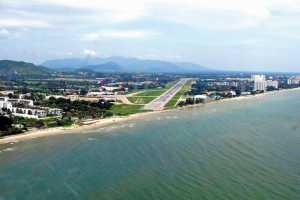
Thailand plans cooking oil recycling for jet fuel
2nd Sep 2022

Thailand could spend 10 billion baht on a project to produce aviation fuel from used cooking oil (BCP), according to the petroleum company Bangchak Corporation Plc. If all goes according to plan, the plan might be put into place as early as the fourth quarter of 2024.
Yesterday, representatives from three firms: BCP, BBGI Plc, and Thanachok Oil Light, signed the documents necessary to make sustainable aviation fuel (SAF) a reality. BCP will own 51% of the business, Thanachok Oil Light will own 29%, and BBGI will control 20%.
For the enterprise to succeed, it will need used cooking oil from Thai citizens. The public will be asked to bring their old cooking oil to 2,000 sites around the country, where they will have the option of selling it to Bangchak or exchanging it for additional oil.
Used cooking oil will also be collected from the food business in Thailand, particularly the nation's many fast food outlets. The food business generates around 17 million litres of wasted cooking oil each month, which is sufficient to manufacture 1,000 litres of bio-jet fuel every day.
The project, the first of its type in Thailand, would get an initial investment of eight to ten billion baht, according to Chaiwat Kovavisarat, chief executive officer and president of BCP.
Chaiwat said that the BCP is collaborating with Italian firms to create the technology necessary to transform wasted cooking oil into aviation fuel. Chaiwat stated that Bangchak already has an advantage...
"For this project, BCP has the benefit of hydrogen, which is a byproduct of the distillation process. Used vegetable oil may be purified using hydrogen and converted into Biojet fuel. It reduces the cost of the project since we are not beginning from scratch."
According to Chaiwat, the worldwide need for sustainable aviation fuel is growing: "If an airline does not use biojet oil, it must purchase carbon credits, which are 3,000 times more expensive." By raising the carbon price from 80-100 euros per tonne to 200 euros per tonne, the European Union will encourage the usage of biojet fuel. Demand will climb dramatically by 2030."
In April, an Airbus A380 flew for three hours using only one engine and biofuel made from used cooking oil and other lipids.









